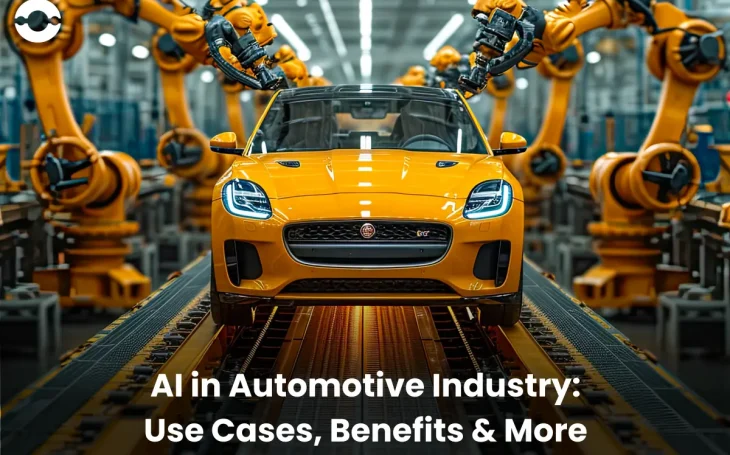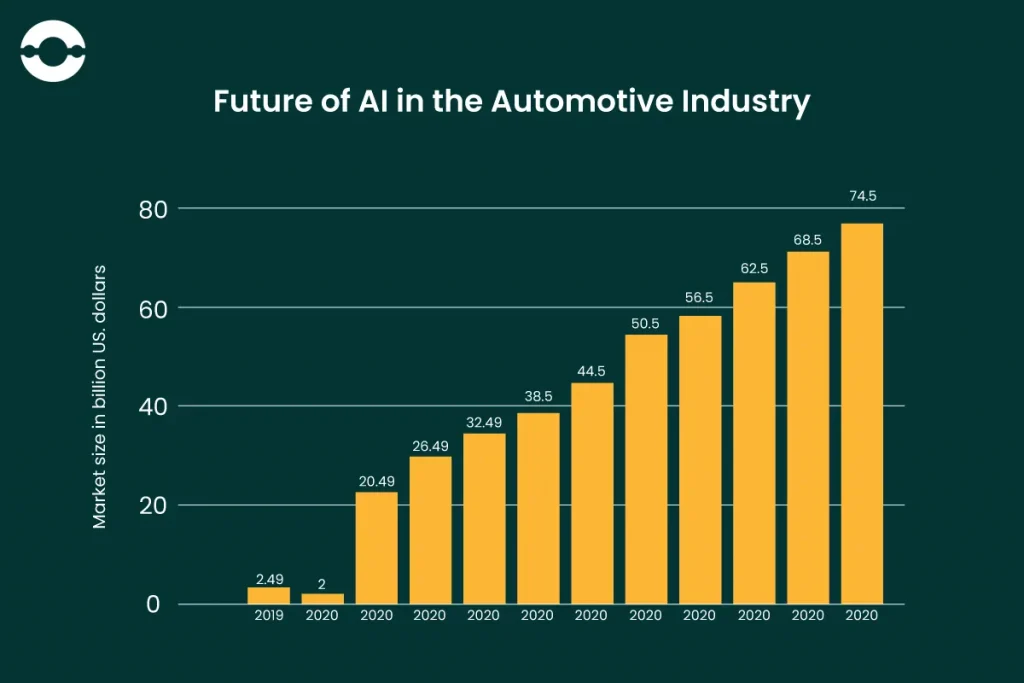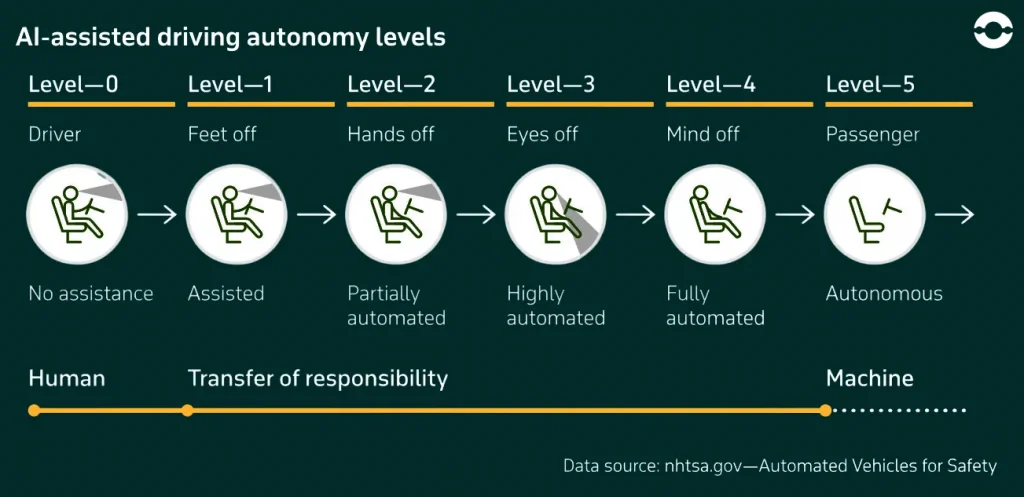
It replies to your spoken commands, understands your requirements, and even helps detect road dangers.
This fascinating dream of automotive innovation based on AI is quickly transforming into a fact, via the implementation of AI within the automotive sector.
Today’s consumers are adapting to the idea that their cars will become as intelligent and customized as their smartphones and digital personal assistants.
But interestingly, the question is: What is AI offering in automotive and how is it influencing the future of travel?
Let us go deep into AI deployment in the automotive field to disclose its application, positive impact, and more.
Firstly, we will go over the market part that is simpler than the plan.
Market Statistics and Revenue Growth of the Industry
Do you realize that the AI market in the automotive industry is estimated to reach $44.5 billion by 2025 and is projected to rise to $74.5 billion by 2030?

It reflects that the AI in this industry is being implemented and adopted rapidly.
Nevertheless, the main question is why this phenomenal growth is taking place?
The diversity of AI uses detected in automotive is the reason for the increase of AI.
It is used from autonomous driving systems to predictive maintenance and by different areas to improve efficiency, safety, and user experience.
For example, advanced driver assistance systems with AI are currently a most part of modern cars that are using AI to make roads safer and more efficient.
In another way, AI has been embraced by vehicles with connected cars and Automotive IoT for data processing in real-time.
Such data come in handy for improved vehicle performance and valuable information to manufacturers and drivers.
Maybe, the most spectacular thing about AI in the transport sector is that it will remodel the process of moving from station to station as it is now.
The consistency of this view is provoking continuous innovation efforts among different automotive companies, tech companies, and new start-ups.
While it is a quite logical that the automotive mobility industry will go through a great transformation after merging with AI and automotive, resulting in the improvement of vehicle safety and reinventing driving experience, taking the automotive industry to unimagined levels.
How is AI changing the Automotive Industry for the better?
Safer Roads
Thanks to artificial intelligence in vehicles, it is possible to recognize any preeminent danger before humans even notice them themselves.
Driving is like having another driving pair of road eyes. Instinctive or the sudden brake reaction or a pedestrian crossing, AI reacts faster helping to avoid collisions than humans can.
Hands-Free Driving
Let us assume that the car has an autopilot feature which permits you to relax and just enjoy the drive. AI is a tool that transcends our limitations.
It’s as if there is a trusted companion at the steering wheel gently leading you down the road clear of traffic. On AI, the roadblocks diminish, and you just merrily drive forward.
Personalized Experience
No matter if people are different, and AI understands that. Being aware of your taste and preferences is like having a vehicle that understands you.
You have likely adjusted the seat, the way you like it and plugged in your favorite music. Everything on a journey is designed to have the best for you. Every trip is a unique experience.
Predictive Maintenance
Nobody wants to suddenly stall mechanically, right? AI takes you one step ahead by notifying you about the issues beforehand so that you can prevent them.
The best part of this is that you have a mechanic who understands your car more than you do and keeps it going smoothly so you do not get any unexpected repair bills.
Fuel Efficiency and Sustainability
AI technology makes cars more environmentally safe not only by cleaning cars but also by achieving higher energy efficiency. It is like having a smart assistant alongside you that helps you in trajectory of reducing fuel consumption and CO2 emissions.
Thinking of using AI for the ideal working of your car’s engine and for an ecological ride brief on how to drive in an environmentally manner, your journey will become more eco-friendly with every ride.
Industrial sectors such as Tesla, Waymo, and Uber are also the drivers of the invention of autonomous cars that lead to a decrease in crash rates, traffic enormously, and outstand others in facilitating urban population’s mobility.
Generally speaking, AI translates the human-car interaction, and electric vehicles link our natural and urban environment.
And now, we are going to analyze several use cases about this transformation in automotive industry.
Top 15 AI Use Cases in the Automotive Industry:
Autonomous Driving
We used to drive by ourselves when we were not aware of the effects. But now they are planning to change the situation.
Currently, self-driving cars can be out there because, fortunately, implementation of AI technology (artificial intelligence technology) makes this happen.
This technology is adapted thus cars can handle truck traffic along the road, making quick choices and passengers can be transported quickly among the mobile points.
AI now takes the role as the one behind driving, eliminating the passenger’s need to be constantly aware.
Intelligent Navigation
Enjoy safe and easy driving with assisted navigation tools.
This system offers you routes that factor in the traffic, weather, and information about you as the driver, to be very clear that you would not get lost on the way and not end up in the trap of traffic jam.
Virtual Assistants
It is like the virtual assistant of your car that lets you adjust settings, get there, and make phone calls while keeping your hands on the wheel.
Through its AI assistants, can-do like Siri and Alexa are meant to guide you to keep yourself safe by driving.
Also Read – Role of AR/VR in Automotive Industry
Smart Parking Solutions
It is so annoying having to search for a parking space, just driving in circles for it. However, an AI-based system gives you the solution to this problem, informing you of a reserved location and parallel parking spot.
Enhanced Vehicle Diagnostics
AI algorithms can read around the data, find anomalies, and localize the situation as early as possible when it is easier to fix it.
AI is the key to making sure that your car is in tip-top shape all the time. Knowing that your car is safe and in perfect condition is right at your fingertips.
Personalized In-Car Entertainment
The algorithms of AI technology can sense your taste in music and send you a personalized lightspeed of music, podcasts or other entertainment goods to come with an impressive driving experience. Here is your personalized playlist tailored for a driving experience on the road.
Traffic Management Optimization
AI-integrated traffic control systems can validate traffic data and change signal timings on the fly, unblocking highway congestion and enhancing traffic flow.
Not only will the AI save you from the rush hours, but the chance to make the most out of the commute.
Supply Chain Optimization
AI Transforms supply chain operations by predicting demand, optimizing inventory levels and detecting and resolving inefficiencies in logistics processes.
AI covers the entire supply chain from end to end with minimal cost, delivering to the consumers with maximum efficiency.
Vehicle Design and Manufacturing
AI algorithms aid design, simulation, and manufacturing processes through the optimization of environmentally friendly features and shortening the vehicle software development schedule.
The advent of AI-fueled creativity has indeed dawned on a new era in the realm of automobile design that is even brighter than ever before.
Enhanced Safety Features
AI-integrated safety features, including machine learning, database, and image processing systems, can detect the collision risk and automatically e-break to prevent crashes.
Feeling your AI to be in charge will bring you a feeling of comfort, knowing that safety will always be a priority.
Fuel Efficiency Optimization
AI algorithms are trained to comprehensively evaluate and analyze driving behavior and vehicle performance data to squeeze every liter from your tank thereby reducing emissions and pocketing you extra cash.
Taken to another level by AI, there will be room for maximum fuel efficiency with no performance compromise whatsoever.
Adaptive Lighting Systems
Intelligent tilting of headlights by the AI-equipped adaptive lighting systems is based on road conditions, climate, and oncoming traffic, so that no deterioration of visibility is possible.
And while AI may shed light into new dimensions, AI will never lose its sight of the future, no matter what the conditions.
Voice Recognition Systems
The AI speech recognition systems as well as voice control within the car have the aim to make the operation of in-car controls and communication hands-free, so that there will be more convenience and safety for drivers while driving.
AI speaks the same your commands through. Therefore, you can easily press the acceleration or braking lever and keep your eyes on the road at the time.
Road Condition Monitoring
AI algorithms process data from onboard sensors as well as from external sources to provide real-time information about the road’s state, obstacles that lie ahead, and the environmental conditions.
The intelligence behind AI knows how to keep you safe and regards any surprises Mother Nature offers.
Augmented Reality Interfaces
By using AI-based augmented reality technology, the heads-up instruments can superimpose the necessary data onto the windshield, such as navigation instructions and points of interest, for improved outside situations.
AI will serve as your companion as you won’t get lost or skip a landmark along the way.
Before you ask how AI works in automotive, let’s check some top companies that are building AI solutions.
Top 5 Automotive Companies Using AI Solutions
1. Tesla
Tesla has adopted Artificial Intelligence as its main driving force in innovation. Tesla employs AI-based algorithms in its EVs to enable the autopilot of cars, as well as intelligent cruise control and intelligent navigation systems.
The AI in the Tesla Fleet System is a self-learning AI that is always monitoring road vehicles and the data is applied to increase performance and safety in every mile the fleet travels.
2. General Motors (GM)
GM employs AI technologies for predictive maintenance, with vehicles being able to self-diagnose and address small problems before they become big ones.
AI algorithms of GM scan a large volume of data coming from sensors and onboard systems and find the patterns and problems, thus improving vehicle’s reliability and minimizing duration for maintenance.
3. Audi
Audi is using AI to significantly improve vehicle dynamics, efficiency, interior comfort and convenience.
Audi AI is ensuring drivers get adaptive cruise control, traffic jam assist, and even predictive efficiency assistance, among other advanced features.
The AI algorithm enables Audi cars to assess both the current road conditions and the driver’s input instantly proceeding with the best course of action for safe and comfortable driving.
4. BMW
Using AI prediction technology, BMW can tailor to customers’ driving experience.
The AI algorithms of BMW can research data from different sources like driving behaviors, road conditions, and vehicle performance to adjust settings (for example, suspension, steering, and climate control) to provide the highest level of comfort and dynamic capabilities conditionally based on individual desires.
5. Waymo
Waymo was the first company to produce autonomous vehicles in which the use of AI made self-driving cars able to navigate through urban settings safely and accurately.
Thanks to a smart mix of sensor fusion, machine learning and sophisticated algorithms, Waymo’s AI can understand its surroundings, make decisions in real time, and interact safely with other road users, all on its own.
How AI in automotive works – 5 levels of vehicle automation
Artificial Intelligence has paired with the automotive industry to change the mobility concept as we know it. Ranging for safer driving to better efficiency and convenience.
With the introduction of different levels of automation, the AI’s role in automobile engineering takes a deeper approach crossing the line to safer, efficient and lastly totally autonomous transportation.

1. No Assistance
This is the level where the driver will be fully dependable for the whole driving process. While there is no robotic automation of AI assistance wanted, it is the simplest way of driving vehicles.
2. Assisted
Here is where AI comes into play to help in some specific function of the driver like adaptive cruise control and lane keeping assistance.
The driver is still the main person controlling the movement, but AI is there to help make the ride safer and more comfortable.
3. Partially Automated
This is the phase in which artificial intelligence takes on greater responsibility, operating some driving operations on its own, for instance, parking assistance or motorway driving.
Nevertheless, the driver is still essential to ensure safety and takeover whenever needed.
4. Highly Automated
At this level, AI becomes almost complete control of the vehicle, and certain conditions are understood, such as traffic jams and highway cruising.
However, in emergency circumstances, a human operator could still be involved, but AI takes up most of the driving duties.
5. Fully Automated
Fully automated driving belongs to the deepest level of vehicle automation, where the artificially intelligent system can safely and effectively drive the car with no human participation.
This grade embodies the case of totally autonomous driving which passes for passengers sitting back and relaxing while the AI is the boss.
6. Autonomous:
Autonomy is not the level fully recognized by regulatory authorities. However, the concept of full autonomy refers to automobiles that operate without any input from humans in all conditions.
Getting this level of automation remains a long-term goal for car companies and their competitors.
What’s the Future of AI in the automotive industry?
The future of driving is around the corner already and many big companies like Tesla, Audi, and Ford have taken the lead in this development.
Artificial intelligence is transforming every automotive design concept, ranging from safety features to interior and exterior designs.
The automation market is flourishing due to this, and with AI chips anticipated to be wholly integrated into vehicles, they can fully manage everything from ease to damage diagnosis.
Such a complex system will also meet the driver’s individual choice for command controls, lighting, and music.
AI is going to be widely adopted in the next 10 years and this revolution in the automotive industry will take the form of intelligent, safe, and more individualized transportation options.
Conclusion
Along with AI will continue its evolution and the impact on the auto industry will only get bigger. With self-driving cars for predictive maintenance, as well as personalized passenger experience, AI enables technology-driven mobility of the future.
At BigOhTech our goal is to leverage AI to produce cutting-edge tech solutions.
Whether it is about AI-powered feature design for your cars or AI integration into your automotive engineering processes, we have expertise and technology that may help achieve your goal. Contact us today to discuss the details of how we can work together and turn your AI-based automotive ideas into reality.




